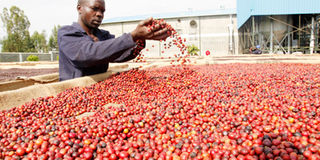280,000 coffee farmers in Busoga decry lack of market

According to the farmers, Agroways does not help them during the post-harvest period and that it has for the meantime restricted its activities to Buwenge. PHOTO BY RACHEAL MABALA
What you need to know:
Justification. The farmers say the company, which took over their union, is more interested in storage of maize and sorghum and not coffee.
About Union. In its hey days, Busoga Growers Cooperative Union owned a number of commercial and residential houses in Jinja, a coffee processing plant in Namulesa on the outskirts of Jinja and a cotton ginnery in Kaliro District. The assets have since been sold off.
JINJA. More than 280,000 coffee farmers in Busoga Sub-region are stranded, saying Agroways Limited, which took over Busoga Growers Cooperative Union (BGCU), lacks capacity to address their market needs.
BGCU was established in 1954 with the aim of bringing coffee farmers in one pool, increasing their productivity, bargaining power and offering market penetration. However, due to mismanagement, the union was in 2015 acquired by Agroways Limited.
Now, farmers say Agroways specialises in providing warehousing and storage facilities for cereals rather than promoting coffee growing, the main aim of BGCU.
According to the farmers, Agroways does not help them during the post-harvest period and that it has for the meantime restricted its activities to Buwenge.
Mr Isaac Kasadha, a coffee farmer in Namulesa, Mafubira Sub-county, says they are missing BGCU.
“Agroways deals mainly in barley, maize and a bit of sorghum. The trickledown effect to the farmers is greatly compromised because the area communities were into coffee production, which Busoga Growers used to store in bulk,” says Mr Kasadha.
“Also, collective bargaining BGCU on behalf of the small holder farmers had led to their economic empowerment since they got the best prices out of their produce,” he adds.
He says Agroways is only benefitting large scale farmers who sell in bulk while small scale farmers are at the mercy of middlemen who sell to the company.
Mr David Wankiya, 59, a resident of Bufuula, Mafubira Sub-county, Jinja District, says the acquisition of the union by Agroways is a setback to farmers.
“Can you believe this union was supplying coffee to then Coffee Marketing Board premises at Bugolobi?” he says.
Mr Joseph Oryama, the manager of the Agroways plant at Namulesa, admits that they are more into storage of grains than coffee.
“While Busoga Growers mainly concentrated on coffee, Agroways is more into storage of grains, notably maize and sorghum. We have about 3,000 tonnes of maize stored in four silos per season and the storage is expected to shoot,” says Mr Oryama.
However, Mr Oryama is optimistic that Agroways will stimulate economic growth in the sub-region. He says the community benefits from the company’s amenities such as free water and training.
By 1982, BCGU, which owned a number of commercial and residential houses in Jinja, a coffee processing plant and a cotton ginnery, had a total capital of Shs2.5 billion.
However, due to mismanagement, the union’s commercial and residential houses were sold off to private individuals while the ginnery and coffee processing plant were sold off to “investors”. The collapse also meant that farmers were now bereft of a platform on which they could bargain good prices for their produce.
Cooperative woes
According to Mr Kasadha, poor administration greatly contributed to the collapse of the Union.
“Its founders, despite being prominent farmers in Busoga Sub-region, were not well learned. They were traditional hands-on men,” he says.
“Secondly, the NRM government, upon capturing power, viewed cooperatives as a UPC thing and pushed for liberalisation which led to a decline in coffee productivity due to farmers’ ethics being compromised,” he adds.
“Also, cooperatives thrived on a specific banking regimen, quite different from conventional commercial banking system,” he says.
Cooperatives minister Fredrick Gume Ngobi says: “I put in place a seven-man committee headed by Ambassador David Kazungu to verify assets lost by the union during the liberation war and quantify what was lost. However, the committee hasn’t yet come up with its findings because it hasn’t been facilitated. However, cooperatives and Saccos are springing up, which I think is good. What people need now is sensitisation.”



